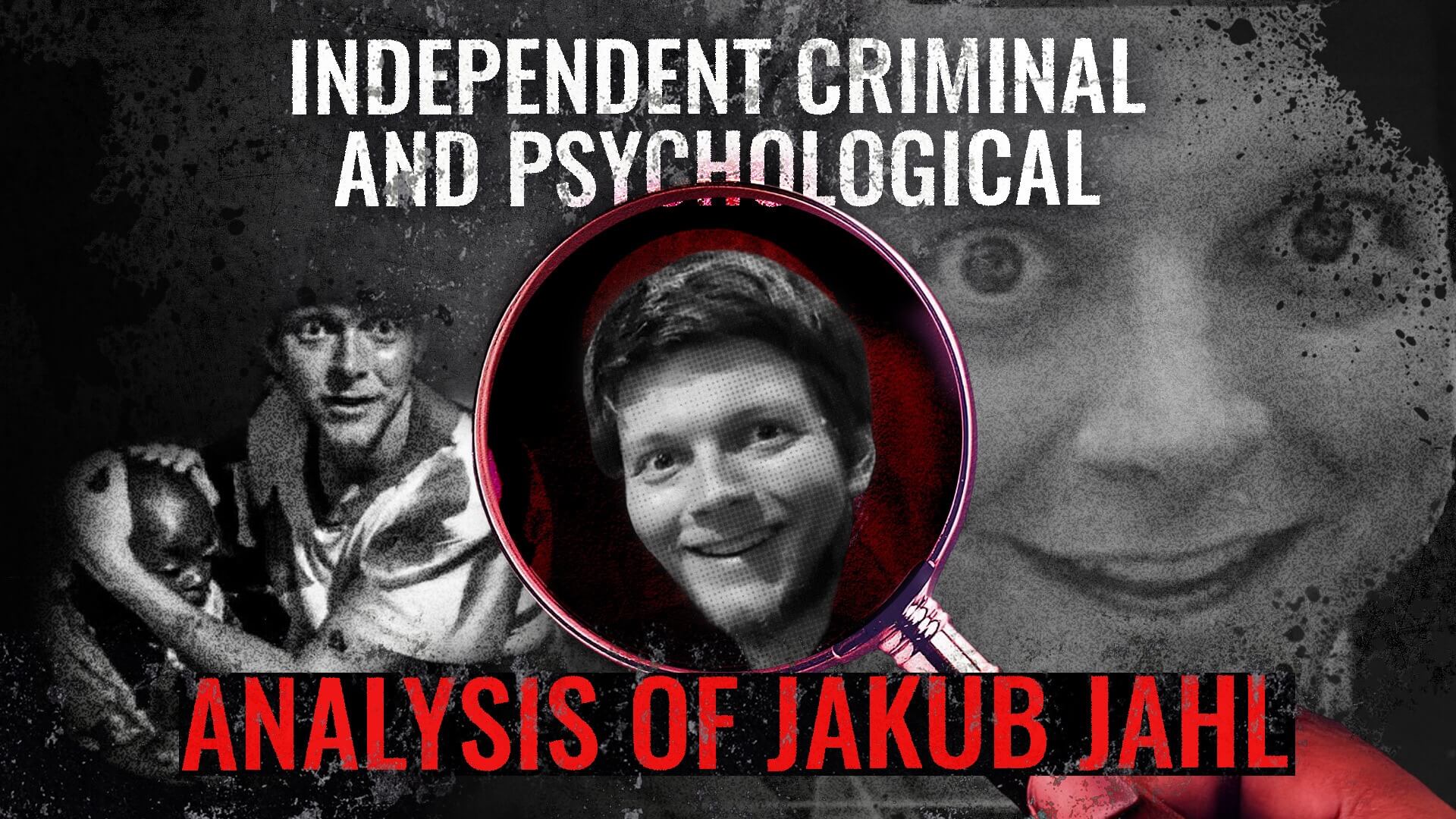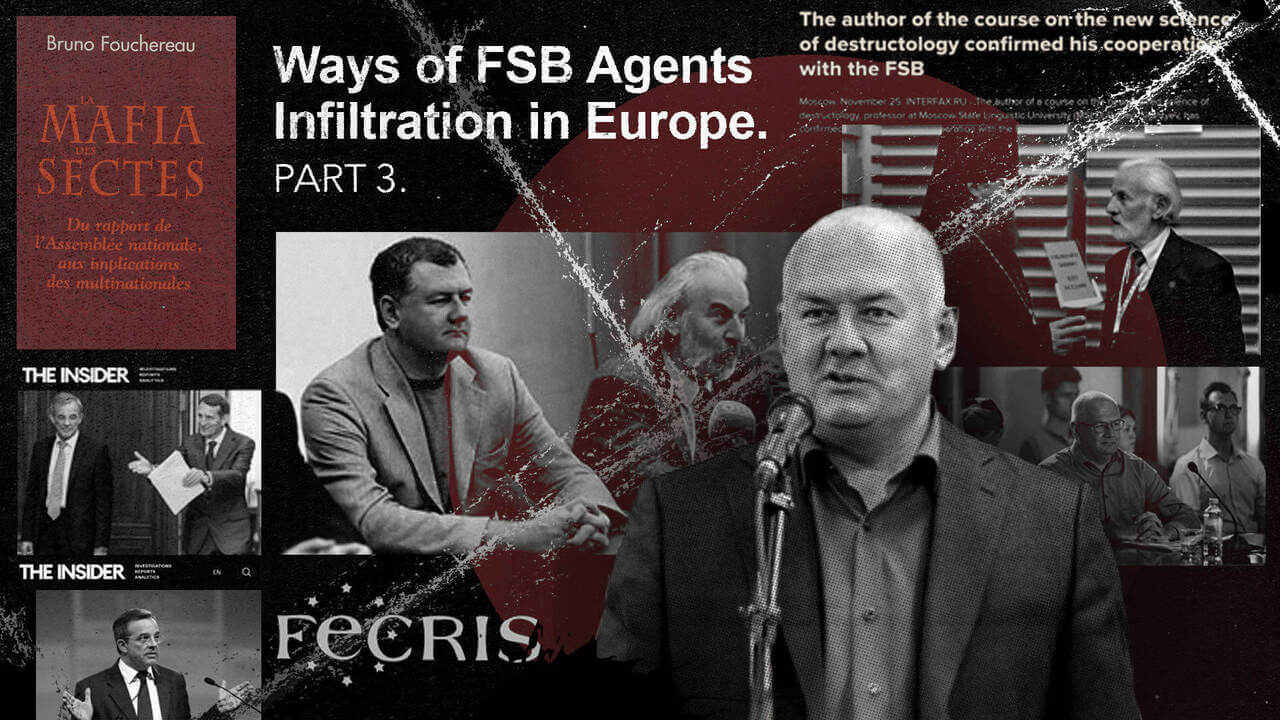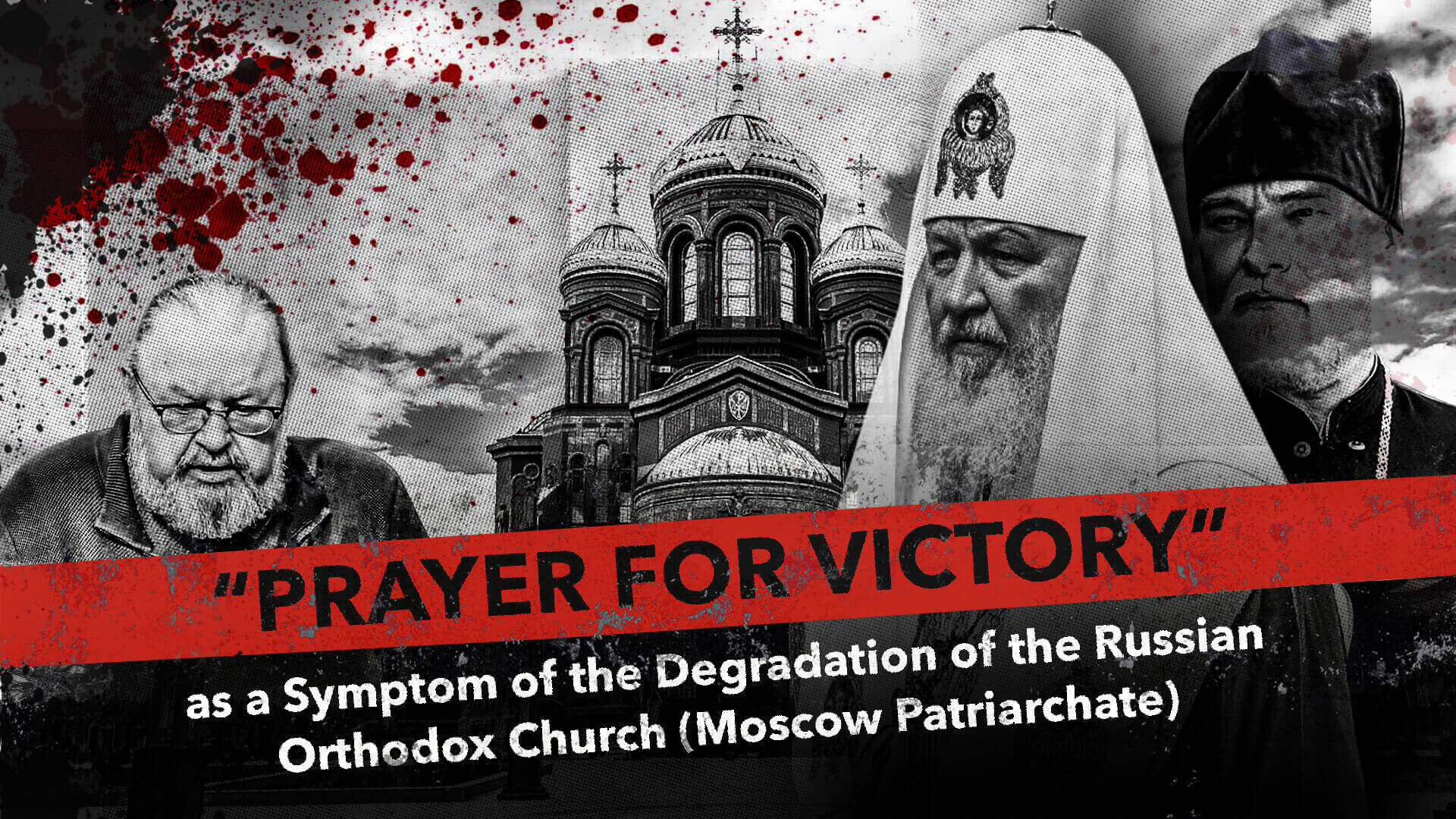Today, it is no longer surprising that representatives of the international anticult network in various countries are not only connected to the Russian pro-religious association RACIRS, but also have direct links with agents of Russian intelligence services. Additional facts have been revealed, shedding light on the motives behind the destructive anti-democratic activities of European anticultists and further confirming their ties to supervisors from Russia’s Federal Security Service (FSS, or FSB). More details will follow below in this article.
To start with, here is an excerpt from our previous article, “Russian Anticult Trail in Latvia. Part 2” , published on the website actfiles.org:
“The most active fighters against sects and cults in Latvia were Oleg Nikiforov, Viktor Yolkin, and Svetlana Krilova. All of them were members of the radical party ‘Latvian Russian Union’ led by the well-known pro-Russian propagandist Andrejs Mamikins (Andrey Mamykin). Currently, Mamikins is internationally wanted for justifying crimes against humanity committed by Russia in Ukraine and is evading justice, hiding in Russia. There, he keeps actively engaging in media activities, including those aimed against Latvia’s interests. He has his own channel on YouTube. More detailed information about him may be found in our previous article.
In the fall of 2006, the year of RACIRS establishment, an article titled ‘Slaves – Not Us?’ was published on the website of the Latvian Russian Union. A workshop on restricting the activities of totalitarian sects was held in the conference hall of the Iceland Hotel in Riga. It was organized and conducted by Oleg Nikiforov and Viktor Yolkin.”
This article, along with another one titled “Russian Anticult Trail in Latvia. Part 1,” prompted further investigation that led to a discovery of additional links between anticultists and FSB agents. Delving deeper into the information has revealed an even more global scale of influence that extends far beyond Europe. To achieve their goals, Kremlin agents including those among anticultists employ a wide array of tools for infiltration, influence, and cover-up tactics. We’ll discuss some of them in this article, while others will be addressed in our future publications.
It is worth recalling that the anticult organization Latvian Committee for Combating the Totalitarian Sects (L.C.C.T.S.) is a member of the European umbrella federation FECRIS that unites many anticult organizations worldwide. In 2018, a conference was held in Riga, the capital of Latvia. It was attended by anticultists affiliated with the Latvian Russian Union party (Latvijas Krievu savienība, or LKS). Key FECRIS members and leaders were also present, including its vice presidents Alexander Dvorkin (president of RACIRS, Russia) and Branka Dujmić-Delcourt (Croatia / Belgium), as well as Luigi Corvaglia (Italy), Alexandra Stein (BBC, UK) Janja Lalich (USA), Frédéric André (Belgium), and others.
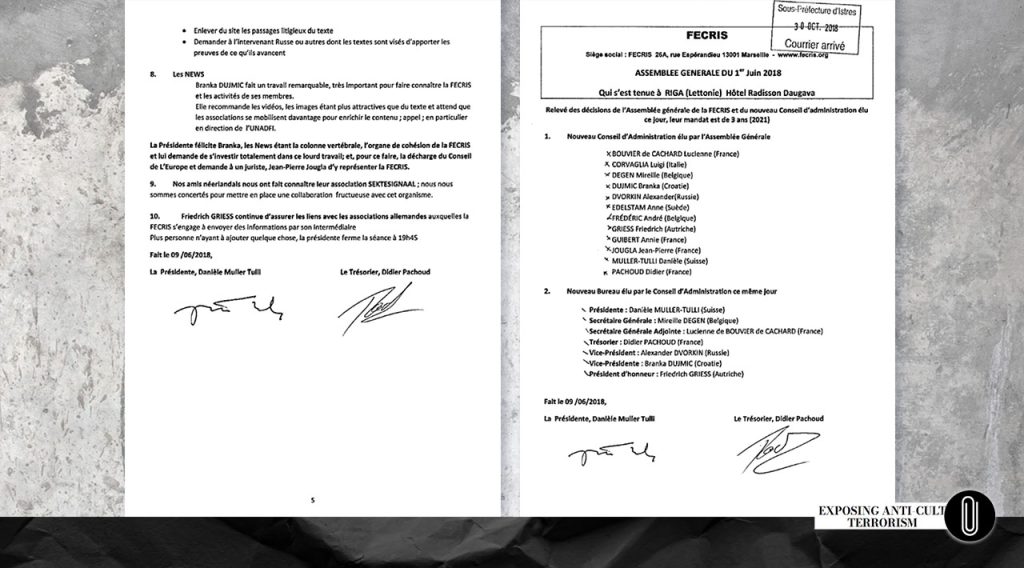
Some of the conference participants were also seen at an informal meeting in Riga together with FECRIS Vice Presidents Alexander Dvorkin and Branka Dujmić-Delcourt.
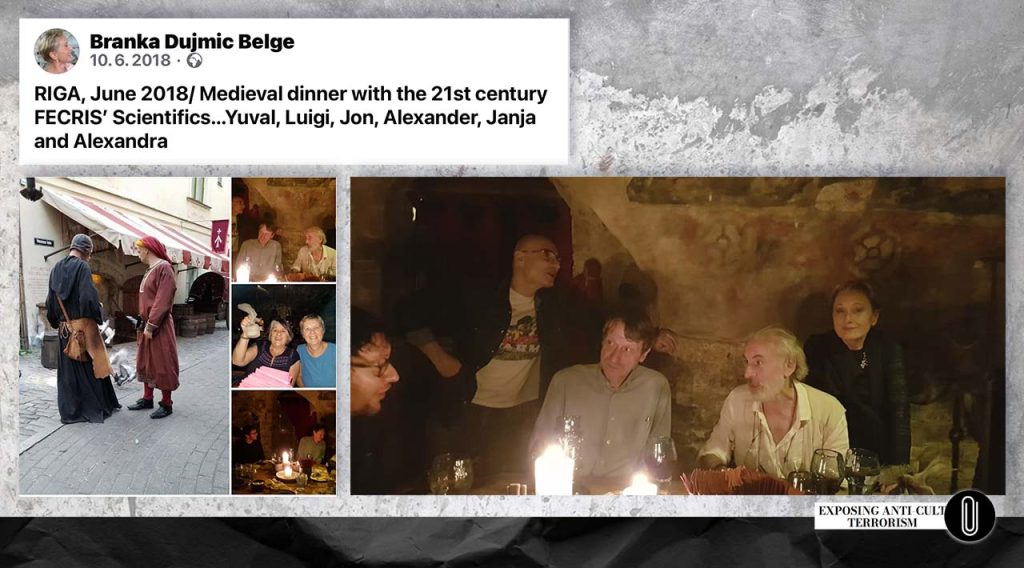
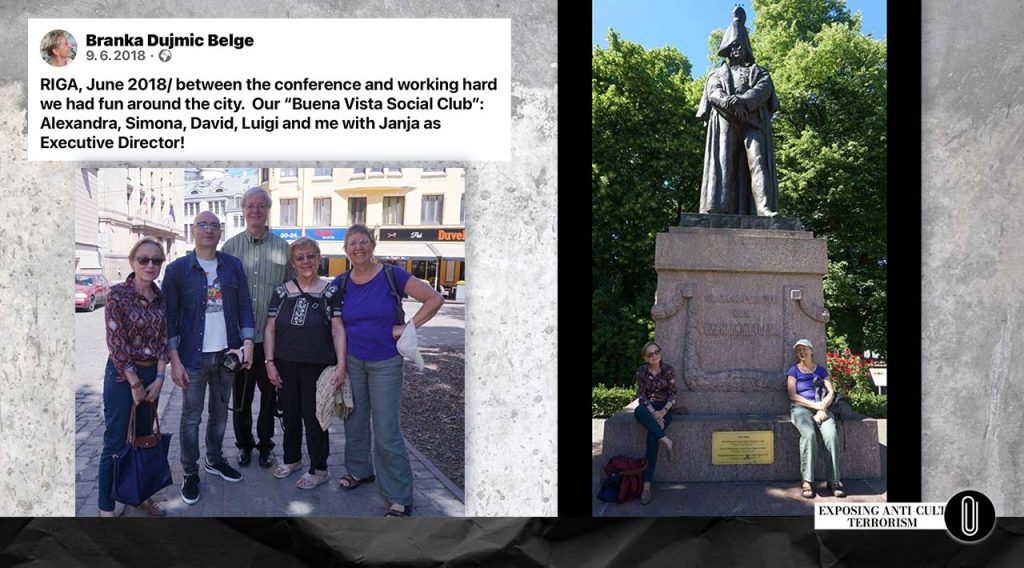
You can read more about this meeting in Riga and the conference participants in the article “Russian Anticult Trail in Latvia. Part 1”. It also reveals details about another participant of that conference, an individual named Andrejs Mamikins, and his anti-democratic pro-Russian activities aimed against Latvia’s interests. In this article, we’ll take a look at his colleague, Tatjana Ždanoka, who has been co-chairwoman of the Latvian Russian Union (Latvijas Krievu savienība) and its predecessors (the Equal Rights party and For Human Rights in a United Latvia alliance) since 1993. Moreover, as it became known as a result of an email leak in January 2024, Tatjana Ždanoka is an alleged FSB* agent.
* The Federal Security Service of the Russian Federation (FSS, or FSB) is Russia’s major law-enforcement agency and the main successor agency to the Soviet KGB.
For starters, let’s consider some aspects of the activities of the Latvian Russian Union and its individual members.
Latvian Russian Union (Latvijas Krievu savienība). Co-chairwoman: Tatjana Ždanoka
Latvian anticultists Andrejs Mamikins, Oleg Nikiforov, and Viktor Yolkin were on the list of candidates for deputies from the Latvian Russian Union (Latvijas Krievu savienība) in the 2018 elections to the 13th Saeima of Latvia. Tatjana Ždanoka, a well-known opponent of Latvian national statehood, was on the list together with them.
![Screenshot from the Latvian Russian Union’s official website [2]](https://actfiles.org/wp-content/uploads/2025/01/14-1-1024x568.jpg)
According to information from other sources, their colleague, anticultist Svetlana Krilova, was also a supporter of the radical political party Latvian Russian Union (Latvijas Kievu savienība).

Some Latvian Russian Union (Latvijas Kievu savienība) members were MEPs, in particular Tatjana Ždanoka, Andrejs Mamikins, and Miroslavs Mitrofanovs 4.
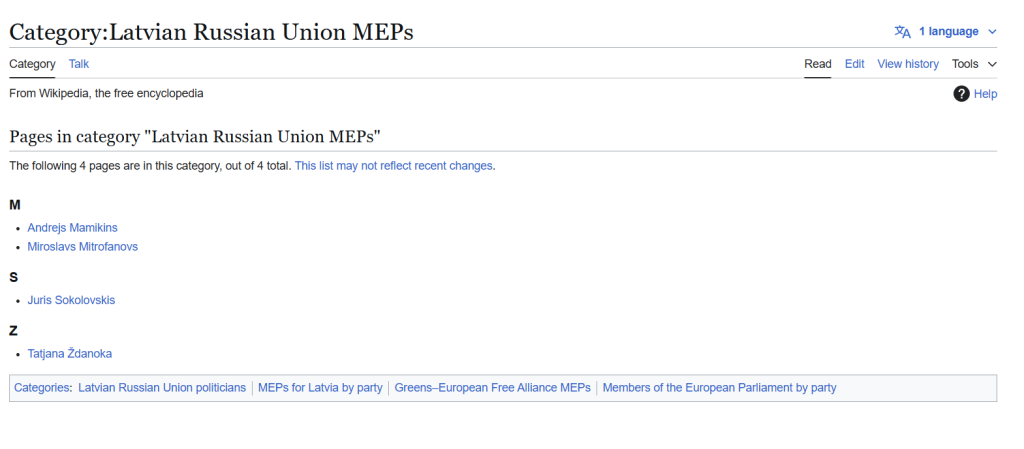
On July 2, 2020, the European Platform for Democratic Elections (EPDE) launched a new database of “biased observers” 5 aimed at identifying “fake” election observers used to promote and legitimize undemocratic regimes and electoral processes. The database list includes dozens of politicians from various countries. Tatjana Ždanoka, Andrejs Mamikins, and Miroslavs Mitrofanovs rank among the top five Latvian politicians included in this database for their support of the disputed elections in Russia and the separatist regions of Ukraine.

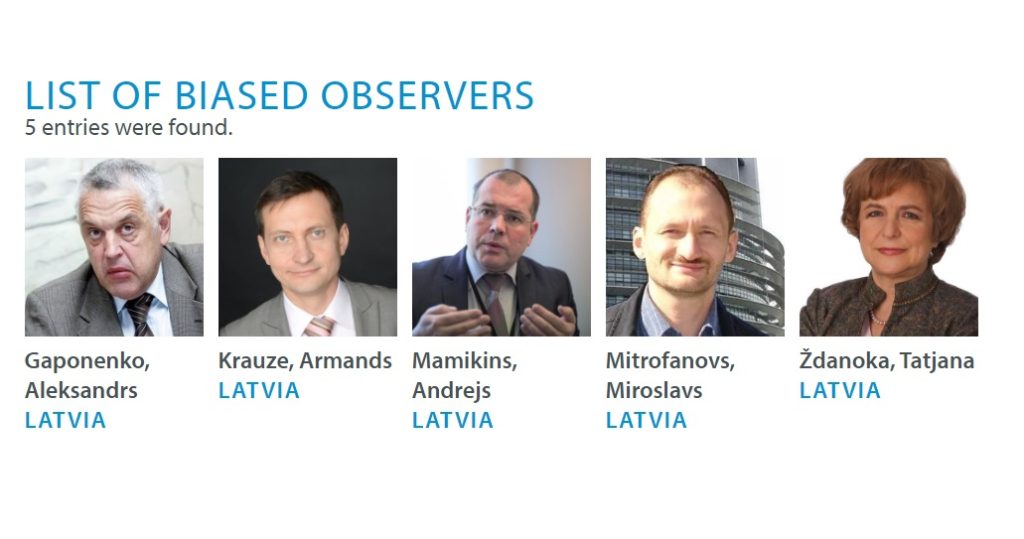
Information about this event was covered by the Latvian public news portal Eng.lsm.lv 6:
“The database is based on researcher Anton Shekhovtsov’s reports on politically biased international observation and according to Shekhovtsov ‘should be of great help for all those who monitor the Kremlin’s influence in Europe and elsewhere.”
“The idea of a database came out of a huge amount of work we had been doing, and we thought it would be very helpful to be able to quickly check all those people. If we see some suspicious quote from a person we don’t know yet, we could check who that person is and whether he took part in any other controversial election observation. ”
“There are people who have been long engaged in this sort of activity. This is what they do. It’s a business. It’s not necessarily that they are paid to do this, but it’s something they have to do if they want access to some of the other resources that are offered by the Russian state… for many politicians and activists, favorable election observation is a starting point for other, probably more significant pro-Kremlin activities.
The database of election observers can be viewed online at: www.fakeobservers.org.”
Tatjana Ždanoka

Tatjana Ždanoka, co-chairwoman of the Latvian Russian Union (Latvijas Kievu savienība) and member of the European Parliament until July 2024, has been an outspoken pro-Russian supporter throughout her long-term career. She herself positioned her activities as human rights advocacy and defense of the rights of ethnic Russians and Soviet heritage in Latvia. However, in many cases, her activities and those of her party members were rather manipulation and speculation of certain topics, and often incitement, serving as a cause of division in Latvian society, a prerequisite for conflicts and clashes that destabilized the Latvian people and played in favor of the mouthpieces of Russian propaganda.
In general, the analysis of her behavior patterns reveals identical methods used by both herself and her fellow anticultists, members of FECRIS, including those being her party members, despite the external differences in their officially stated goals and their spheres of influence. The consequences of their activities in society are also identical: division, polarization, escalation, undermining the rule of law and democratic foundations, and weakening of their countries.
Below are several examples of publications that confirm the destructive influence of her activities during various periods of her political career.
2004: “Zhdanoka Candidacy Polarizes Latvian Election” 8
![Screenshot from The Jamestown Foundation website [8]](https://actfiles.org/wp-content/uploads/2025/01/20-854x1024.png)
2009: “European elections strengthened pro-Russian sentiment in Latvia” 9
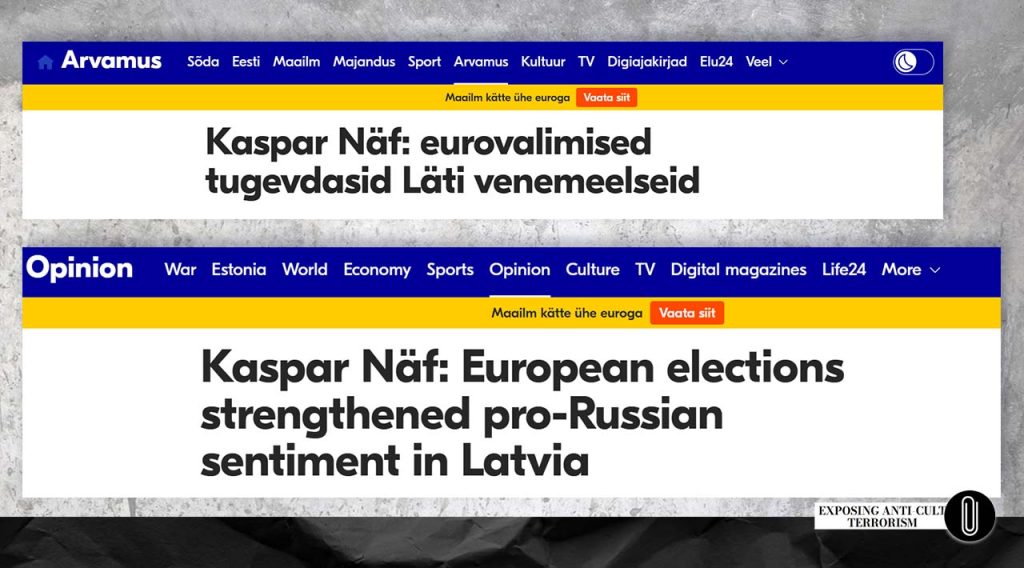
2014: “Security Police investigates Latvian Pro-Kremlin MEP” 10
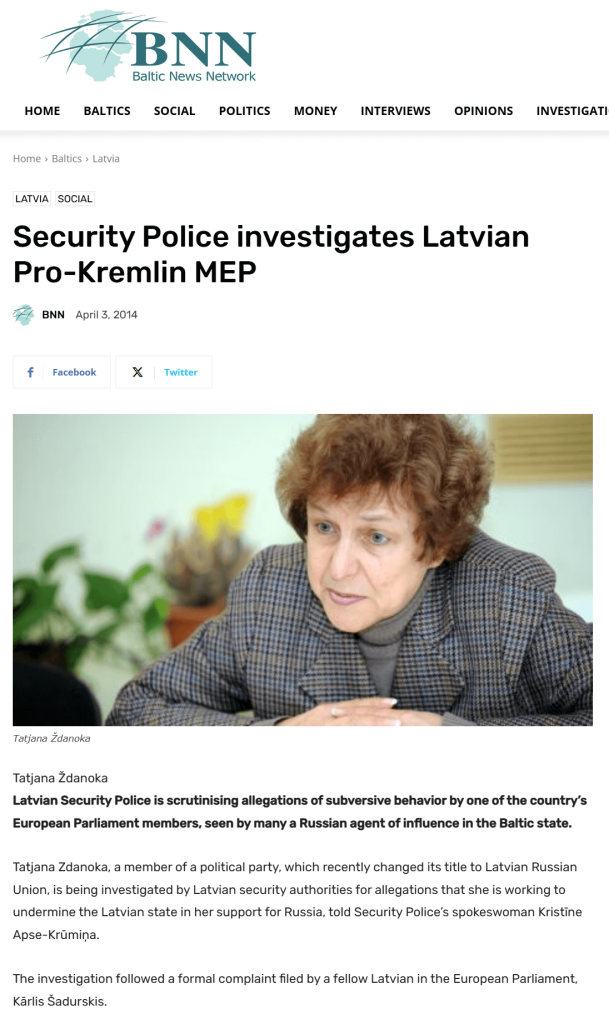
“Latvian Security Police is scrutinising allegations of subversive behavior by one of the country’s European Parliament members, seen by many a Russian agent of influence in the Baltic state.
Tatjana Ždanoka, a member of a political party which recently changed its title to Latvian Russian Union, is being investigated by Latvian security authorities for allegations that she is working to undermine the Latvian state in her support for Russia, told Security Police’s spokeswoman Kristīne Apse-Krūmiņa.”
Tatjana Ždanoka’s views were noticeable many years ago. From 1988 to 1989, she was one of the leaders of the Interfront, a political organization that opposed Latvia’s independence from the Soviet Union and rapid market reforms. Many years later, already in independent Latvia oriented towards European democratic values, the Latvian Russian Union (Latvijas Kievu savienība) supported the annexation of Crimea and assumed a pro-Russian position in the subsequent Russian-Ukrainian war. In support of the annexation of Crimea by the Russian Federation on March 11, 2014, Tatjana Ždanoka together with other members of her party organized a rally near the representative office of the European Commission in Riga 11. In August 2014, the party signed a cooperation agreement with the Crimean branch of Russian Unity party in order to “strengthen the unity of the Russian world” 12.
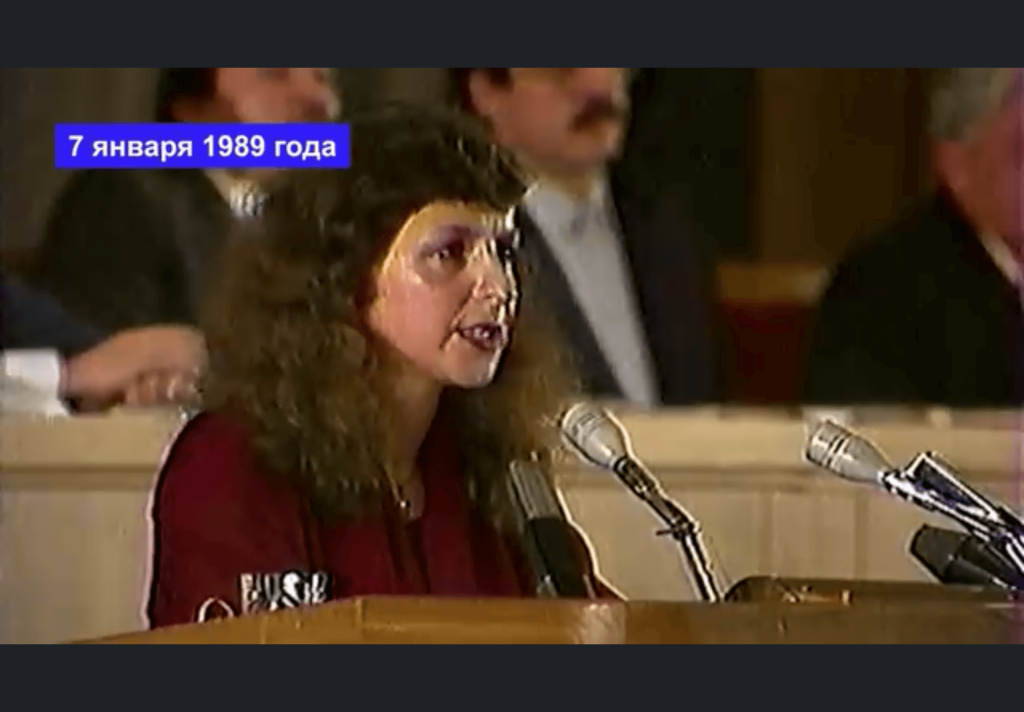
Tatjana Ždanoka has been one of the leaders of the Equal Rights movement since its foundation in 1993 and the association For Human Rights in a United Latvia 8. Ždanoka has also been systematically condemning the Baltic region for alleged infringement of the rights of ethnic Russian diasporas. It is noteworthy that such “anti-discrimination” efforts by the Latvian MP have a response precisely among front radical groups funded by the Kremlin, which pose as NGOs allegedly committed to the ideas of “human rights,” “antifascism,” and “anti-Nazism.”
Does this sound familiar? A similar pattern was observed in Ukraine before 2014, ahead of the conflict in Eastern Ukraine, and again before 2022, when the Russian army began its full-scale invasion of Ukraine. During these times, Russian agents, including those among Ukrainian anticultists and agents of Alexander Dvorkin, were spreading the narrative of Nazism and sectarianism in Ukraine and the alleged need to “denazify” the country. This rhetoric later became the official justification for the outbreak of a bloody war and the deaths of peaceful Ukrainian citizens. Notably, despite her anti-Nazi public stance, during Russia’s annexation of Crimea and her presence in Crimea while observing the “elections” there in 2014, several of Ždanoka’s international colleagues were actual fascists and neo-Nazis from countries like France, Austria, Germany, and the United Kingdom.
![Screenshots from Expressen website [13]](https://actfiles.org/wp-content/uploads/2025/01/25-1024x568.jpg)
![Screenshots from Expressen website [13]](https://actfiles.org/wp-content/uploads/2025/01/26-1024x568.jpg)
“Latvian politician and member of the European Parliament Tatjana Ždanoka, 73, has long made herself known for her outright support of Russia. Both in the Baltics and in Brussels, she has been spreading propaganda regarding alleged violations of Russians’ rights in the Baltic states and defended pro-Kremlin policies. In the European Parliament, she refused to condemn Russia’s attack on Ukraine.”
It has been noticed that “human rights” are a golden niche for many anticultists and those who openly advocate for the pro-Russian agenda and justify military aggression against peaceful Ukrainian citizens, as well as for FSB agents in general. They are the first to loudly advocate for the alleged protection of human rights, but they do it in a way beneficial to themselves, or more precisely, to their supervisors. Their defense usually concerns fake victims specifically created to justify discrimination and purposefully discredit the perpetrators they identify, that is, the undesirables. Under such circumstances, truly innocent people often suffer from their accusations and slander.
In other cases, victims whose rights are violated are quite real, yet their rights are not being protected. There is merely speculation and playing on this topic by means of the same standard accusations: while anticultists claim that “sectarians” or “cult members” are to blame for everything, Kremlin agents put all the blame on the West. This has been the case for a long time, but it’s important to note that at some point these two forms of accusations merged, and recently such wordings appeared as “the West is one big cult.” So who are anticultists today, indeed?
We should immediately note that these conclusions by no means justify real violations of human rights if they occur anywhere. However, anyone’s manipulation and speculation on this subject is no less unacceptable in a transparent, civilized society that strives for true democracy.
Now, let us note a few more points from Tatjana Ždanoka’s biography. Tatjana Ždanoka attended a summer camp of the pro-Kremlin youth organization Nashi. Interestingly, this organization is referred to as “Putinjugend” (“Putin’s Youth”) due to the documented facts of intolerance and aggressive behavior of its members towards dissidents 14.
In 2016, Ždanoka voted against the European Parliament resolution of November 23 which condemned the use of disinformation and propaganda by Russia and Islamist terrorist organizations. Moreover, before the vote, Tatjana Ždanoka circulated a letter among MEPs, containing various arguments including justification of Russian news channels that she claimed to be no different from Western media, and she also recommended the European Parliament members to watch RT.
* RT (formerly Russia Today) is an international news television network funded by the Russian government and targeting audiences outside Russia. Scholars, fact-checkers, and reporters have identified RT as a source of disinformation and conspiracy theories. The UK media regulatory authority Ofcom has repeatedly revealed that RT violated its own impartiality rules and broadcasted substantially misleading content. In 2012, RT’s editor-in-chief Margarita Simonyan compared the channel to the Russian Ministry of Defense. Referring to the Russo-Georgian War, she stated that RT “carries out an information war against the entire Western world.”
![Screenshots from the website of Public Broadcasting of Latvia (eng.lsm.lv) [15] [16]](https://actfiles.org/wp-content/uploads/2025/01/27-28-1024x568.jpg)
On March 2, 2022, Tatjana Ždanoka was one of 13 MEPs who voted against condemning the Russian invasion of Ukraine. Among other representatives of the Latvian Russian Union (LKS), it is important to note the involvement of Evgeny Osipov. In April 2022, a post from 2013 by LKS council member Evgeny Osipov resurfaced, which he and other members of their party had shared. In the post, he threatened “war” if the monument to the liberators of Soviet Latvia and Riga from the German-fascist invaders was moved “even by a millimeter” 17. The political party Latvian Russian Union (Latvijas Kievu Savienība) was the only major political entity that opposed Latvia’s membership in NATO.
Tatjana Ždanoka and her correspondence with FSB officers
Since at least 2004, Tatjana Ždanoka has been working under the guidance of supervisors from the FSB’s Fifth Service. This became known due to leaked emails from Ždanoka’s account and subsequent publication of those. The Insider independent edition, in collaboration with Delfi Estonia, the Latvian Re:Baltica, and the Swedish Expressen, investigated the cooperation of this Latvian politician with Russian intelligence agencies. The investigation findings were made public in January 2024 18. Authors of the report include investigative journalists Christo Grozev, Michael Weiss, and Roman Dobrokhotov. It’s a key investigation of this case, so we have based our publication on it and will repeatedly cite excerpts from it below.
We should also clarify that after analyzing this report, thoroughly studying some of Tatjana Ždanoka’s subversive activities, and having previously examined the activities of anticult agents in detail, we were shocked by the similarities and oftentimes even the identical nature of their steps, methods, and goals they subsequently achieve. The anticult network of RACIRS agents, regardless of the country they are in or the external game they play, essentially operates in the same way as FSB agents, merely disguising themselves with the noble intentions of “protecting society” and “helping people.” This answers a question that may arise for readers of this article: why do we focus so much on Tatjana Ždanoka’s trips, speeches, and meetings? And why do we cite extensive excerpts from the investigation report, using them as examples? We do this to clearly demonstrate the true objectives of Russian agents, including those among the anticult agents of RACIRS in various countries across the world.
Let’s take a look at some excerpts from The Insider’s investigation 18.
![Screenshot from The Insider website [18]](https://actfiles.org/wp-content/uploads/2025/01/29-1024x833.png)
“Leaked emails between Ždanoka and her two known Russian case officers include explicit, detailed reports from Ždanoka to her handlers describing her work as a European legislator, particularly as those official duties relate to fostering pro-Kremlin sentiment in her native Baltic region. Other correspondence involves arranging physical meetings in Moscow or Brussels between Zdanoka and her Russian handler, along with requests for funding from Russian sources to underwrite her political activities in Latvia and the European Parliament.”
“According to the emails, her first case officer was a veteran FSB cadre from the St. Petersburg central directorate, Dmitry Gladey, 74, who ran Ždanoka from approximately 2004 to 2013. After 2013, Ždanoka was in regular contact with Sergei Beltyukov, an FSB operative since 1993.”
“‘I can testify that the only people with whom I have sat at the same table, and with the certain knowledge that they are/were Russian FSB officers, are Vladimir Putin and Sergei Naryshkin,’ Zdanoka said. (Naryshkin is the current director of Russia’s Foreign Intelligence Service (SVR), the successor of the KGB’s First Chief Directorate).”
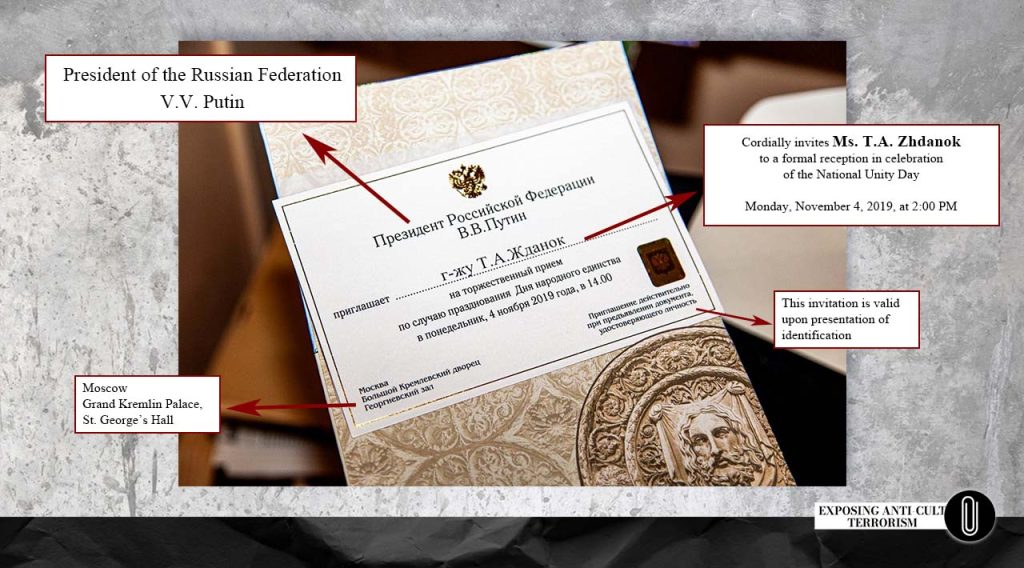
“Despite holding a Latvian passport, Ždanoka has nevertheless built a career opposing its existence as a sovereign country. Indeed, Ždanoka has been outspoken in her support of Latvia’s eastern neighbor, Russia, along with that former colonial master’s well-documented, ongoing efforts to interfere in the Baltics. In 2009, the Moscow City Council sent Russian diplomat Georgy Muradov as an envoy to Riga. Muradov’s visit coincided with preparations for that year’s European Parliamentary elections, and his activities on the ground in the Latvian capital included lobbying ethnic Russians there to vote for Ždanoka, in part by disbursing money to Russian World War II veterans to incentivize their support.
Тoday Muradov serves as the deputy head of Rossotrudnichestvo in occupied Crimea. Officially, that body serves as the cultural arm of the Russian Foreign Ministry; unofficially, at least according to Western intelligence services, it is a none-too-subtle clearinghouse for Russian espionage. According to a source from one of those Western services, Muradov himself is a spy. A review of Muradov’s data footprint shows several links between the ‘diplomat’ and the FSB, including his residential address — Michurinsky Prospect 29/1, which is located on a Moscow block of multi-storeyed apartment buildings primarily inhabited by FSB and, less frequently, SVR officers. One of Muradov’s neighbors at this Moscow address is Alexei Alexandrov, a member of the FSB assassination team that poisoned Russian opposition leader Alexei Navalny with the military-grade nerve agent Novichok in 2020.
In 2014, five years after Muradov’s trip to Riga, Ždanoka traveled to Crimea to serve as an “international observer” in the illegitimate referendum that paved the way for Russia’s illegal annexation of the Ukrainian peninsula.”
Another five years later, European anticultists followed suit and traveled there.20 In 2019, representatives of the French government’s anticult agency MIVILUDES, established to combat so-called “sects” (“cults”), visited the Crimean Peninsula.
![Screenshot from The European Times website [20]](https://actfiles.org/wp-content/uploads/2025/01/31-929x1024.png)
“Support of the Russian occupation of Crimea by a MIVILUDES’ current member and former President
Fenech was replaced as President of MIVILUDES in 2013 but came back to join its Orientation Council in 2021. Nevertheless, his acquaintance with the Putin’s regime had not stopped in the meantime. In 2019, he was part of a delegation led by French MP Thierry Mariani that visited the occupied Crimea, a trip paid and organized by Russians (The ‘Russian Fund for Peace,’ according to Mariani). They were received by Leonid Slutsky, Chairman of the Committee on International Affairs in the Russian State Duma, and Vladimir Konstantinov, a Crimean MP who is accused of high treason in Ukraine, sanctioned by the European Union since 2014, and a strong supporter of Putin and the Russian annexation of Crimea. The purpose for the French delegation was to testify about how well Crimea was doing under Russian occupation. When journalists asked Mariani who was part of the delegation11, Georges Fenech asked him to lie and say that he was not there, which Mariani reluctantly accepted to do. Unfortunately, French journalists from Liberation had recognized Fenech in a Russian documentary that flanked the visit, and Mariani had to admit Fenech was part of the delegation which had even met Vladimir Putin himself in Simferopol.”

MIVILUDES is part of the umbrella federation FECRIS (funded by the French government), which includes the aforementioned Latvian anticultists and associates of Tatjana Ždanoka. For many years, France’s MIVILUDES worked closely with FECRIS; both organizations actively supported and had Russian anticultists, including representatives of the Russian Orthodox Church with radical monarchist views. Their anti-Western and anti-Ukrainian rhetoric has persisted for decades. Nevertheless, this did not prevent European anticultists from sharing the stage with them, co-organizing conferences, and, as recently as 2021, having Russian anticultist Alexander Dvorkin, president of the pro-religious Russian organization RACIRS, serve as FECRIS vice president.
Following instances of international condemnation of FECRIS 21,22,23 at the start of Russia’s full-scale invasion of Ukraine in 2022, references to Dvorkin as vice president disappeared from FECRIS’ official websites but remained on Russian platforms related to Dvorkin. Regardless, he retained his position on FECRIS’s board of directors alongside Italian anticultist Luigi Corvaglia and American Janja Lalich — a familiar lineup, isn’t it? It is worth recalling that these individuals participated in the 2018 anticult conference in Riga, organized by Latvian anticultists and associates of Tatjana Ždanoka from the Latvian Russian Union.
![Screenshots from PSTGU website (Alexander Dvorkin's profile) [24]](https://actfiles.org/wp-content/uploads/2025/01/33-34-1024x568.jpg)
![Screenshots from the Radonezh website (Alexander Dvorkin's profile) [25]](https://actfiles.org/wp-content/uploads/2025/01/35-36-1024x568.jpg)
![Screenshots from the FedPress website (Alexander Dvorkin's profile) [26]](https://actfiles.org/wp-content/uploads/2025/01/37-38-1024x568.jpg)
Dmitry Gladey — Tatjana Ždanoka’s First FSB Supervisor
Below are excerpts from The Insider’s report:
“Ždanoka’s first case officer was Dmitry Gladey, 74, a veteran FSB cadre from St. Petersburg. For decades, Gladey’s public-facing role has been as one of Russia’s representatives to various election monitoring organizations. His most recent role is that of chairman of the International Institute for Monitoring the Development of Democracy. The institute was formed by the Interparliamentary Assembly of the Commonwealth of Independent States in 2006 with the declared purpose to ‘facilitate the exchange of information, generalization of best practices in the development of democracy and parliamentarism, and observance of citizens’ electoral rights’.”
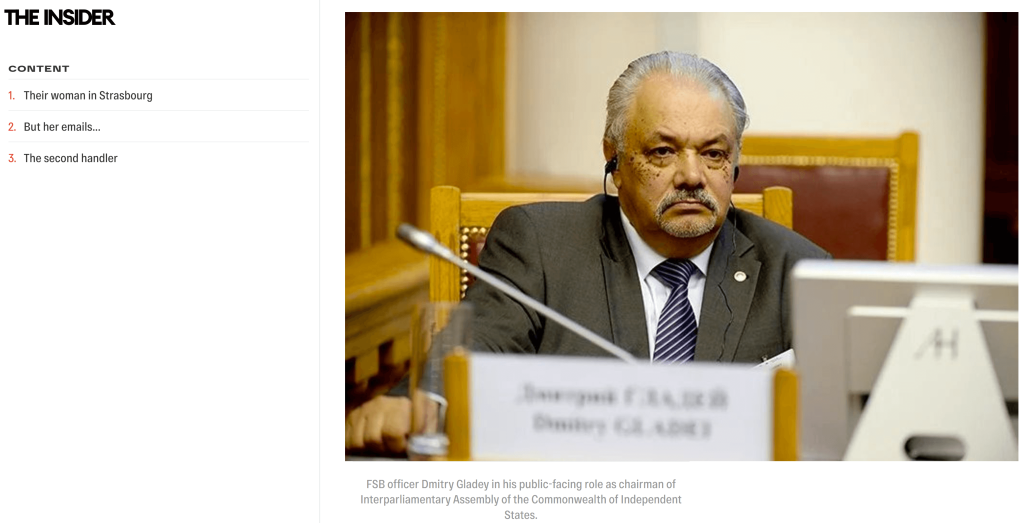
“Gladey’s ties to the Russian intelligence are evidenced by his access to ‘state secrets’ and ‘restricted/controlled travel’ outside of Russia, as The Insider was able to establish based on Gladey’s appearances in a Russian government database hacked by Ukrainian hackers. Leaked travel data from Russia’s Sirena booking database also shows that Gladey frequently traveled on joint bookings with other FSB operatives, which the same government database links explicitly to the agency’s Fifth Service.
The Fifth Service was founded in the 1990s and repurposed in 2004 to counteract the wave of pro-democratic ‘color revolutions’ then sweeping such post-Soviet countries as Georgia, Ukraine and Kyrgyzstan. More recently, it was responsible for politically destabilizing Ukraine and recruiting potential fifth columnists there in advance of Russia’s full-scale invasion on February 24, 2022. The destabilization operation originated through a series of visits to Kyiv by Fifth Service members — including by its chief, Gen. Sergei Beseda — during the Maidan uprising in early 2014. On one of the trips, Beseda urged then-President of Ukraine Viktor Yanukovich to use force against the demonstrators, who were demanding that the government in Kyiv sign on to a long-negotiated association agreement with the EU.”
The origins in the 1990s, the opposition to color revolutions, the destabilization of Ukraine, and the recruitment of agents ahead of Russia’s full-scale invasion—all these actions just described in relation to the FSB’s Fifth Service mirror the activities of anticultists and align with the goals and objectives of RACIRS’s anticult operatives in Ukraine.
We previously exposed the story of Pavel Broyde — a key Ukrainian anticultist, recruiter, propagandist, RACIRS agent, and Alexander Dvorkin’s accomplice. Anticultist Pavel Broyde engaged in destabilizing several regions in Ukraine, building an agent network, and carrying out ideological and informational resistance to Ukraine’s two Maidans in 2004 and 2013. His subversive activities were exposed thanks to leaked emails from the account of Russian presidential adviser Vladislav Surkov, to whom Broyde submitted his reports.
Is it a coincidence that RACIRS agents, who allegedly fight against ‘sects’ (‘cults’), and FSB Fifth Service agents share the same goals and objectives, identical rhetoric, and identical methods? It wouldn’t be surprising if they even had the same handlers. Moreover, anticultist Pavel Broyde worked in the PR team of Yanukovych. So who are the anticultists really? And where are the security services of democratic states looking?
“‘Tsarist Russia used to be a gendarme of Europe, and Putin’s Fifth Service was supposed to be the gendarme of the post-Soviet region,’ Andrei Soldatov, a London-based Russian journalist and author specializing in the Kremlin’s security services, told The Insider.” 18
But let’s return to Tatiana Ždanoka’s correspondence with FSB Officers.
“The earliest communication between Gladey and Ždanoka examined by The Insider is dated October 3, 2005. Ždanoka sent two attachments to Bladey’s email address ([email protected]). One of them was an unpublished draft agenda for an upcoming conference in Tallinn and Narva, Estonia, sponsored by two parliamentary blocs — the European Parliament’s Green-European Free Alliance group and the European Russian Alliance. The second was a draft press release about the conference, an event purportedly organized to discuss, in the words of Ždanoka, ‘the experience of Russian politicians’ participation in municipal governments and the experience of collaboration between NGOs and local government institutions. Within the EU today there are up to 6 million people for whom Russian is the native language.”
“Suspicion surrounding the true allegiances of the European Russian Alliance, of which Ždanoka is a member, are not new. As far back as 2005, Estonia’s Internal Security Service, known by its native acronym KaPo, stated in the body of its publicly disseminated annual report that the ‘NGO’ was little more than an FSB front, and that its founding had been ‘prepared in St. Petersburg and reported directly to the Director General of FSB as a triumph.’”
Interestingly, the Russian city of St. Petersburg has frequently appeared as a hub for interactions between Russians and foreigners, serving as a center for personnel allocation and preparation of new projects. Notably, one of the key anticult symposia, where the new leadership of the European umbrella federation FECRIS was elected in 2009, took place precisely in St. Petersburg.
Is it a coincidence that Alexander Dvorkin — the president of Russia’s pro-religious organization RACIRS — was elected as vice president of FECRIS at the time? Furthermore, the president elected then was British anticultist Tom Sackville, who currently leads 27 the British anticult organization alongside anticultist Alexandra Stein — a BBC expert . Stein attended the 2018 anticult conference in Riga, Latvia, organized by Tatiana Ždanoka’s associates.
![Saint Petersburg, 2009. Anticult symposium. Alexander Dvorkin. Alexander Novopashin (second from the right), Tom Sackville (first from the right). Photos from the Ansobor website [28].](https://actfiles.org/wp-content/uploads/2025/01/40-41-1024x568.jpg)
![Screenshots from NEWSru.com, 2009 [29]](https://actfiles.org/wp-content/uploads/2025/01/42-43-1024x568.jpg)
The following excerpt from The Insider’s report:
“KaPo was not the only intelligence service to make the connection between the European Russian Alliance and Russian espionage services. ‘It was designed as a vehicle for indoctrination and to establish meetings between bosses from Russia, rezidenturas [Russian spy stations] in Brussels and compatriots,’ one Western intelligence officer said, speaking to The Insider on the condition of anonymity. ‘The best part is the FSB managed to run their operations with European taxpayer money. MEPs such as Ždanoka were financed by their parliament factions, in this case the Greens/European Russia Alliance.’”
In the case of the European anticult federation FECRIS, the key portion of its funding comes from the budget of the French government.
“…As a Member of the European Parliament, she [Tatjana Ždanoka] added, she attended several conferences organized by Gladey’s Interparliamentary Assembly of the Commonwealth of Independent States in St. Petersburg.
Ždanoka’s version of the origin of her acquaintance with Gladey does not explain why she sent emails containing attachments called ‘reports’ to Gladey and coordinated her political activities with the Russian operative by sharing draft initiatives and press releases with him. She also frequently arranged to meet with Gladey in Europe; however, the purpose and nature of their face-to-face discussions were never mentioned in the digital correspondence.
On October 3, 2006, Gladey wrote to Ždanoka: ‘I am arriving at MIDI on Wednesday at 12:40, returning at 17:30,’ with MIDI referring to the Brussels South train station that connects to Brussels airport. Ždanoka replied: ‘Very good, I will come to MIDI – let’s meet on the platform by the train. If we miss one another – [let’s meet] at the main entrance of the station.’”
![An email from Tatjana Ždanoka to her FSB handler Dmitry Gladey dated October 3, 2006. Screenshot from The Insider website [18].](https://actfiles.org/wp-content/uploads/2025/01/44-1024x243.png)
Overall, such correspondence was conducted without details and specifics, which were reserved for in-person meetings. However, there were exceptions. Below is another screenshot of an email from Ždanoka to Gladey, with more detailed information (a week after their meeting in Moscow).
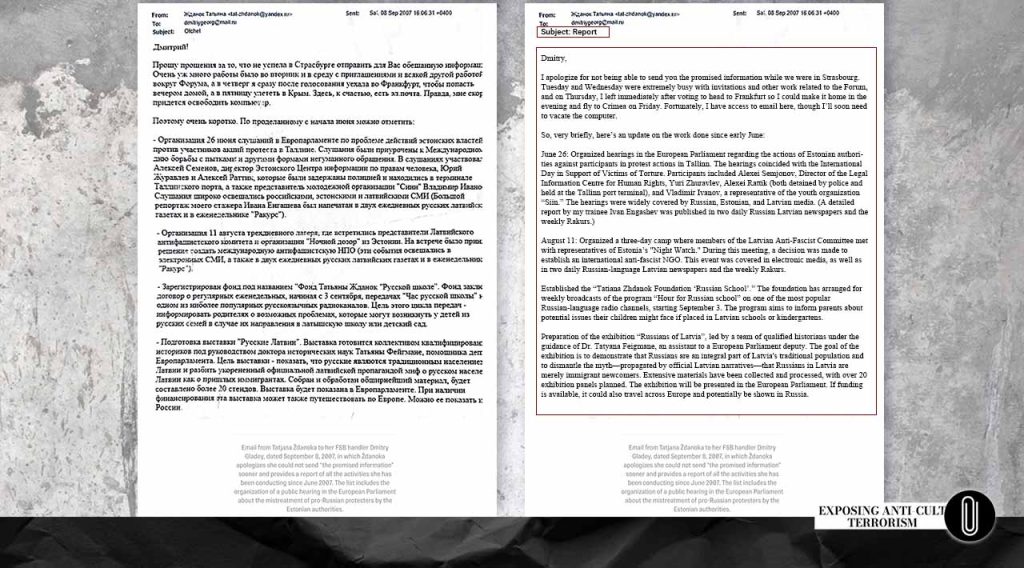
It should be noted, based on information in The Insider’s report, that Ždanoka organized public hearings in the European Parliament. The topic was the Estonian government’s response to the violent protests in Tallinn — the so-called “Bronze Soldier” crisis in April 2007, which coincided with a series of cyberattacks on Estonia, which, as later revealed, originated from Russia. Ždanoka informed Gladey that the hearings received coverage in Russia, Estonia, and Latvia, partly due to the efforts of her “intern” Ivan Yengashev.
“As Harrys Puusepp, the Head of Bureau at Estonia’s KaPo Internal Security Service, told The Insider, ‘Ždanoka’s activities in Estonia are part of a Kremlin-coordinated divisive operation. We first mentioned the divisive activities associated with her in our annual review 20 years ago. The Baltics are treated as a single region by the Kremlin, using the same template to divide, often involving the same people and organizations.’
Ždanoka even launched a radio show called ‘The Hour of the Russian School’ in Latvia, which warned Russians in the country of the ‘possible problems of sending children from Russian families to Latvian [language] schools.’ She also noted that she was putting together a forthcoming exhibition in the European Parliament, titled ‘Russians of Latvia,’ to promote the ahistorical idea that ethnic Russians were the true indigenous population of Latvia.” — and again, this parallels the activities of Ukrainian anticultist Pavel Broyde, an associate of Alexander Dvorkin, who created his own network of agents among Ukrainian citizens. His agents’ activities significantly contributed to the dissemination of propaganda beneficial to RACIRS, the division of the Ukrainian people, and the destabilization of Ukraine, laying the groundwork for the subsequent Russia-Ukraine war.
In 2013, the protocol for Ždanoka’s correspondence with her handlers changed. On September 12, Dmitry Gladey forwarded a report sent to him by Ždanoka to a new disposable email address, [email protected]. Later, Gladey introduced to Ždanoka a person named “Sergey Krasin.” “Sergey Krasin” communicated with Ždanoka using a disposable email address with a similar number — [email protected]. Ždanoka first directly contacted “Krasin” on December 12, 2013, and subsequently sent all her future reports to him.
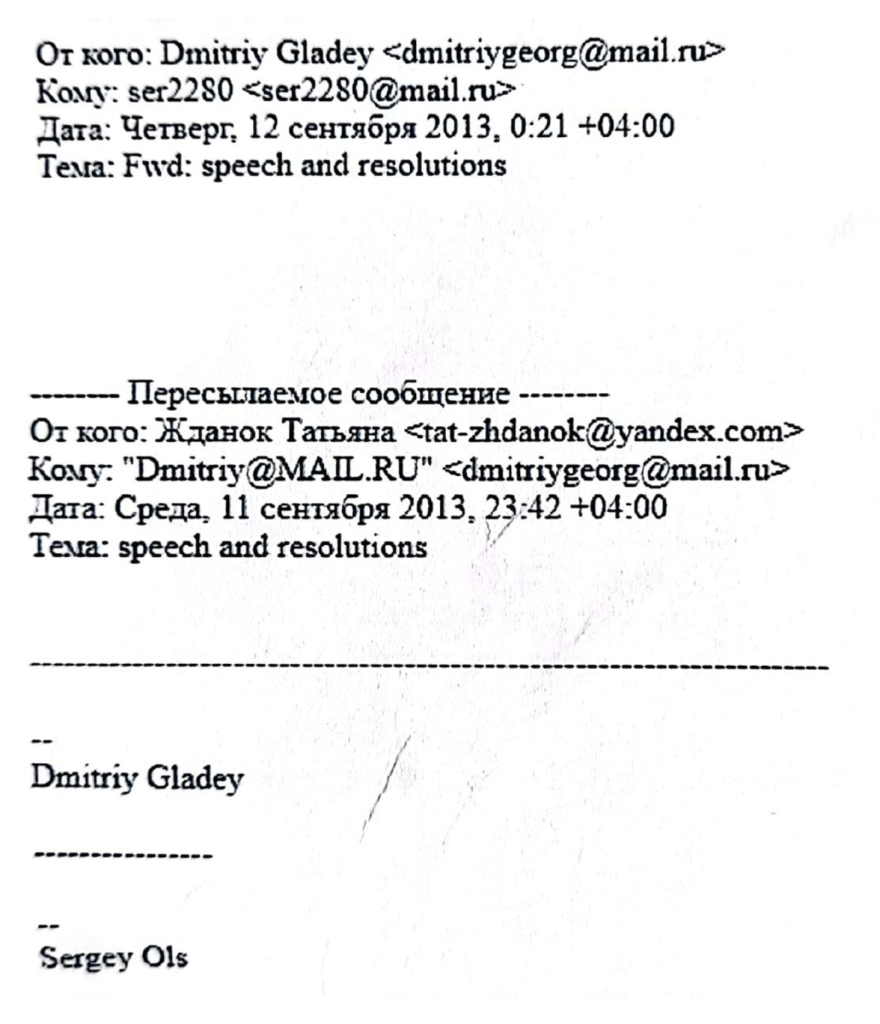
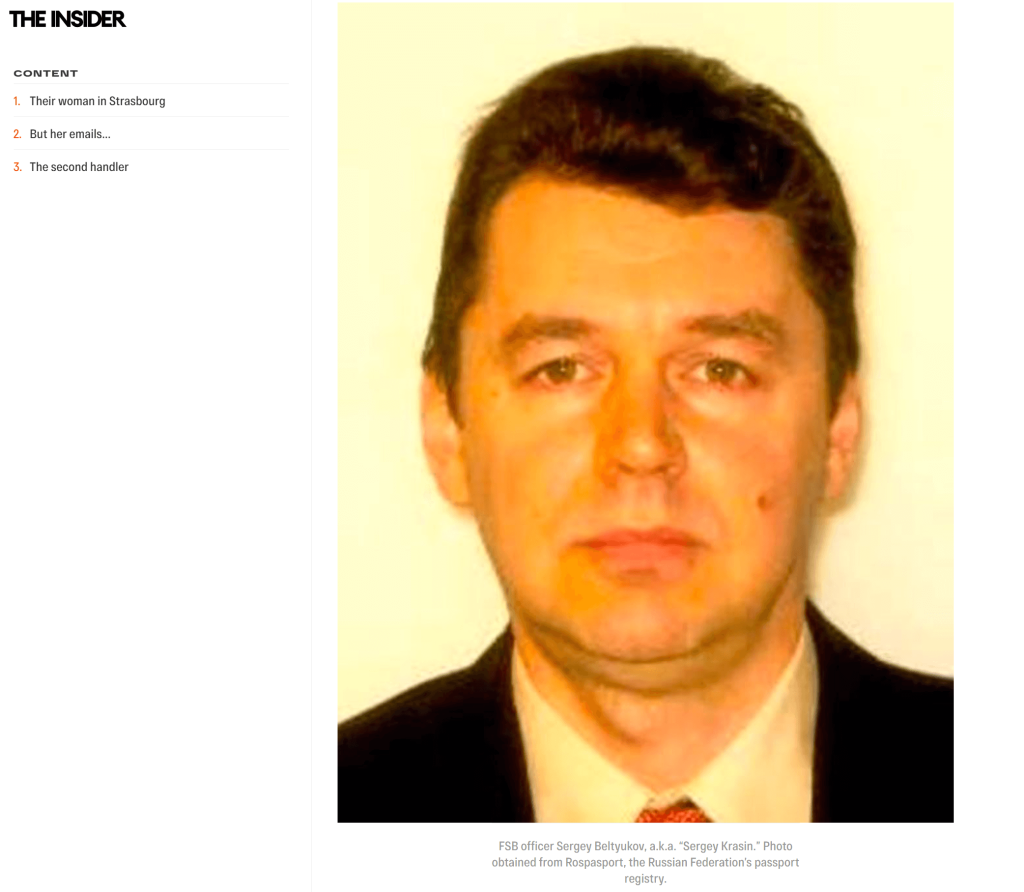
“The Insider was able to identify ‘Krasin’ based on a unique leaked password that was used by the owner of the [email protected] email account. The password was also used for logging in to an account with a telephone number that belongs to Sergey Beltyukov, an active FSB officer from St. Petersburg. The Insider identified several other emails from the numbered range used by Beltyukov, all starting with the same letters (“ser”) and sharing the same password, thus allowing the investigative team to conclude with a high degree of certainty that ‘Sergey Krasin’ is in fact Sergey Beltyukov.
Born in 1970, Beltyukov graduated from the St. Petersburg Economic University in 1993. His employment records, obtained by The Insider, show that he has been an employee of the FSB headquarters in St. Petersburg since that year. Furthermore, leaked data shows that in 1993 Beltyukov received form-2 secrets access, the second-highest level of security clearance in Russia. The clearance restricts its holder from embarking on any international travel other than trips approved by the FSB.”
On January 14, 2017, Ždanoka sent him an email about organizing a delegation from Latvia to attend an event in St. Petersburg.
“Hello Sergey,
Congratulations on all the holidays that have occurred and will occur in January! I have a big request for you: Need your help in finding out whether it’s still possible for a group of 8 people from Latvia to join the foreign delegations that will be received in St. Petersburg on the anniversary of the lifting of the blockade. Traditionally, I cover travel costs of such groups, whilst the administration pays for accommodation and catering. I understand that timing is tight. We were not able to send the request on time due to a major break in the Embassy’s activities which was not much in conjunction with holidays but rather with the change of Ambassador. In addition, I got sick and was not advised that the letter to the Ambassador from the blockade survivors whom I am in charge of curating, failed to be delivered.
Best Wishes,
Tatiana Zhdanok”
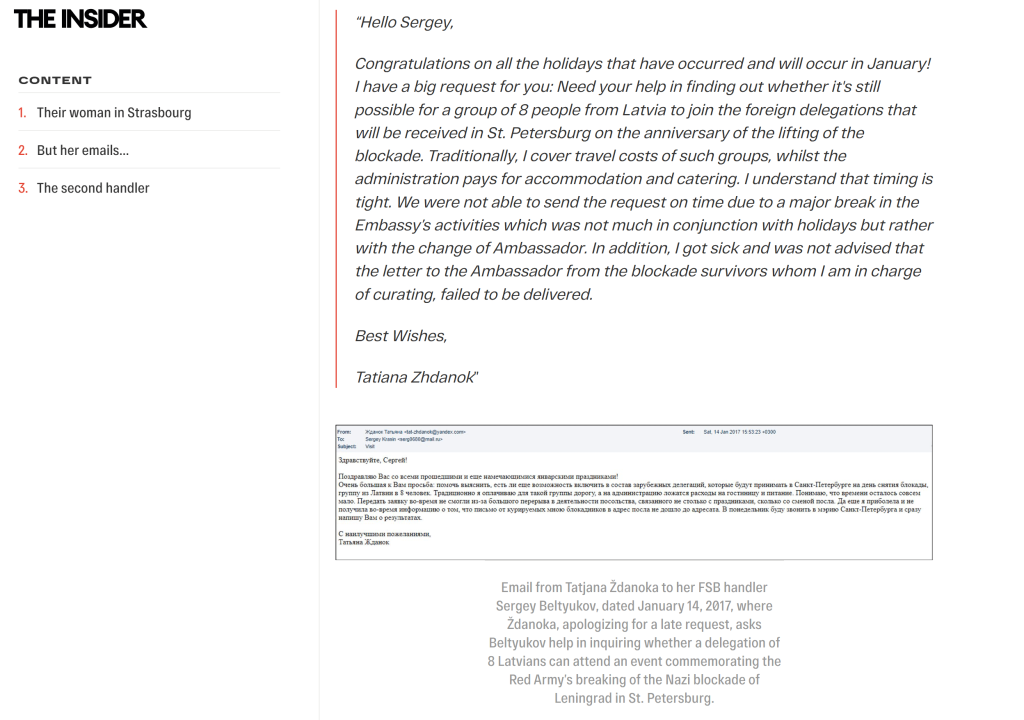
These partial excerpts from The Insider report clearly confirm the connection between the Latvian deputy, Member of the European Parliament, and FSB officers. The connection between her political party and anticultists from various countries, including members of FECRIS, has also been substantiated. Moreover, Tatjana Ždanoka herself has been observed cooperating not only with anticultists from Latvia but also with a key figure in the international anticult movement, Alexander Dvorkin (President of RACIRS, Vice President of FECRIS, and Vice President of DCI).
Tatjana Ždanoka and Alexander Dvorkin
In November 2010, hearings on religious freedom in Russia were held in the European Parliament in Brussels, organized by Dutch MEP Cornelis de Jong and Belgian Willy Fautré, head of the NGO Human Rights Without Frontiers. Alexander Dvorkin, President of RACIRS and Vice President of FECRIS, applied to participate in the hearings on the topic “Religious Freedom in Russia: Abuses of the Extremism Law Against Religious Minorities.” However, his application was denied. Following this, he sought assistance from Latvian MEP Tatjana Ždanoka, but he was denied entry to the European Parliament. Eventually, Ždanoka’s secretariat managed to secure a pass for Dvorkin, but it came with the condition that he would not participate in the hearings and would only visit Latvian deputy Ždanoka’s office.
![Screenshots from Iriney.ru [30]](https://actfiles.org/wp-content/uploads/2025/01/49-50-1024x568.jpg)
![Screenshots from the Gorod.lv website [31]](https://actfiles.org/wp-content/uploads/2025/01/51-52-1024x568.jpg)
Law Enforcement Reaction Following the Disclosure of Ždanoka’s Connections with FSB Officers
Due to her work in the European Parliament, Tatjana Ždanoka frequently traveled not only to Riga, Latvia, but also to Belgium (Brussels) and France (Strasbourg). These visits coincided with committee meetings or general plenary sessions in the European Parliament, which is a typical schedule for an MEP. However, such international activity had its consequences, drawing the attention of law enforcement after the disclosure of Ždanoka’s correspondence with FSB officers in January 2024.
The reaction was not limited to Latvian security services. In November 2024, Belgian law enforcement, at the request of Latvian State Security Service (VDD), conducted searches at the residence of former European Parliament deputy Tatjana Ždanoka (LKS) in Brussels.
![Screenshots from the TVnet.lv website [32]](https://actfiles.org/wp-content/uploads/2025/01/53-54-1024x568.jpg)
It is worth noting that such a significant response from relevant services is unprecedented. Previous repeated attempts to draw law enforcement attention to Ždanoka’s subversive, anti-democratic activities aimed against Latvia’s interests failed. However, each time, criminal cases were closed due to a lack of evidence 33,34,35 . This allowed for the continuation of the Latvian MEP’s cooperation with the FSB, as well as the implementation of projects beneficial to the Kremlin in Europe. It was only after the leak of Tatjana Ždanoka’s emails that security services began scrutinizing her activities.
This raises a logical question: in order for law enforcement agencies to pay attention to the activities of agents of anti-democratic forces and activists involved in anticult activities — does it also require leaking emails?
If so, the precedent has already been set in the case of Ukrainian anticultist Pavlo Broyde. However, how significant will Ukraine’s experience, which ultimately led to war, prove for European countries? Only time will tell. That said, the anti-democratic activities of anticultists over the past 30 years, involving elements of destabilization and connections with highly questionable individuals and groups, can no longer be dismissed as mere coincidence. Or will the relevant authorities still regard all these facts as coincidental?
Another Coincidence
On our part, let us highlight yet another striking coincidence: the anticultists and FECRIS leaders, citizens of Italy and Croatia, followed a route similar to that of Tatjana Ždanoka, making appearances in Strasbourg and Brussels, including in the Belgian Parliament. Below is a photo of Branka Dujmić-Delcourt and Luigi Corvaglia in the Belgian Parliament. These same individuals were observed in Riga in 2018 at a conference alongside MEP Andrejs Mamikins, other Latvian anticultists, and Ždanoka’s colleagues. Notably, in 2015, Branka Dujmić-Delcourt shared the position of Vice President of FECRIS with Alexander Dvorkin.
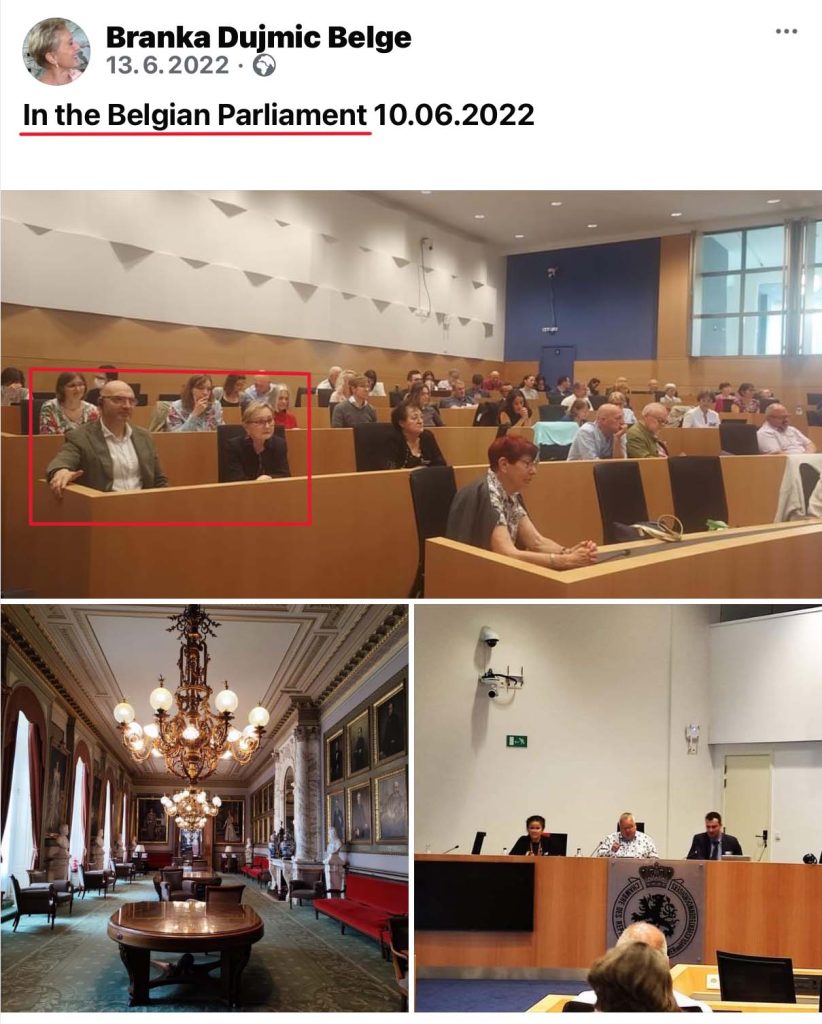
The current FECRIS president, André Frédéric 36, has been a member of the Belgian Federal Parliament for an extended period, which grants him direct influence over legislation (e.g., the 2011 law on the “Abuse of Weakness” 37). He also attended the 2018 conference in Riga, as evidenced by screenshots of FECRIS documents provided earlier in this article 1. Throughout his anticult career, Frédéric has been repeatedly observed collaborating with Russian anticultists from RACIRS as well as the anticult organization MIVILUDES that discredited itself.
![Screenshot from FECRIS website [36]](https://actfiles.org/wp-content/uploads/2025/01/56-1024x728.png)
Information about anticultists like André Frédéric (current FECRIS president), Georges Fenech (MIVILUDES), and Tom Sackville (former FECRIS president) is also available on the website of RACIRS Vice President Archpriest Alexander Novopashin 38. Archpriest Novopashin was a member of FECRIS until 2022.
![Screenshots from the Ansobor website [38]](https://actfiles.org/wp-content/uploads/2025/01/58-1024x610.png)
Based on social media posts by FECRIS Vice President Branka Dujmić, four years earlier, in January 2018, Branka Dujmić-Delcourt visited Strasbourg and Brussels. It is worth recalling that in 2005, the umbrella anticult federation FECRIS was granted the special “participatory status” at the Council of Europe as an international NGO. Since then, this international anticult network, which includes representatives from various countries, including Russia, has legally engaged with mass media and authorities in multiple countries.
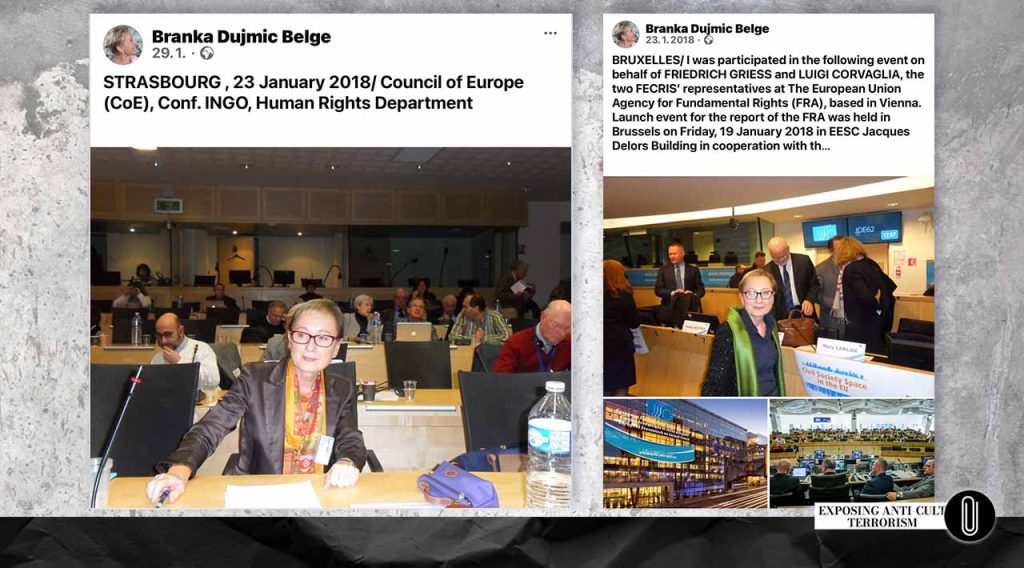
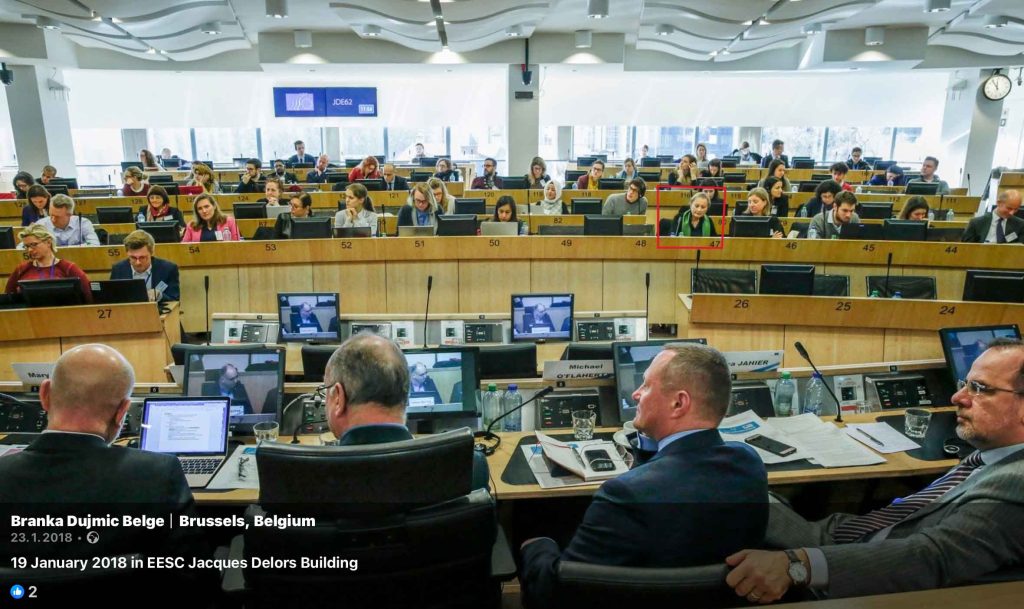
March 2018, once again in Brussels, but this time at a demonstration with Anonymous against the infiltration of Scientology into Belgian schools. The demonstration took place in front of the European Scientology Center.
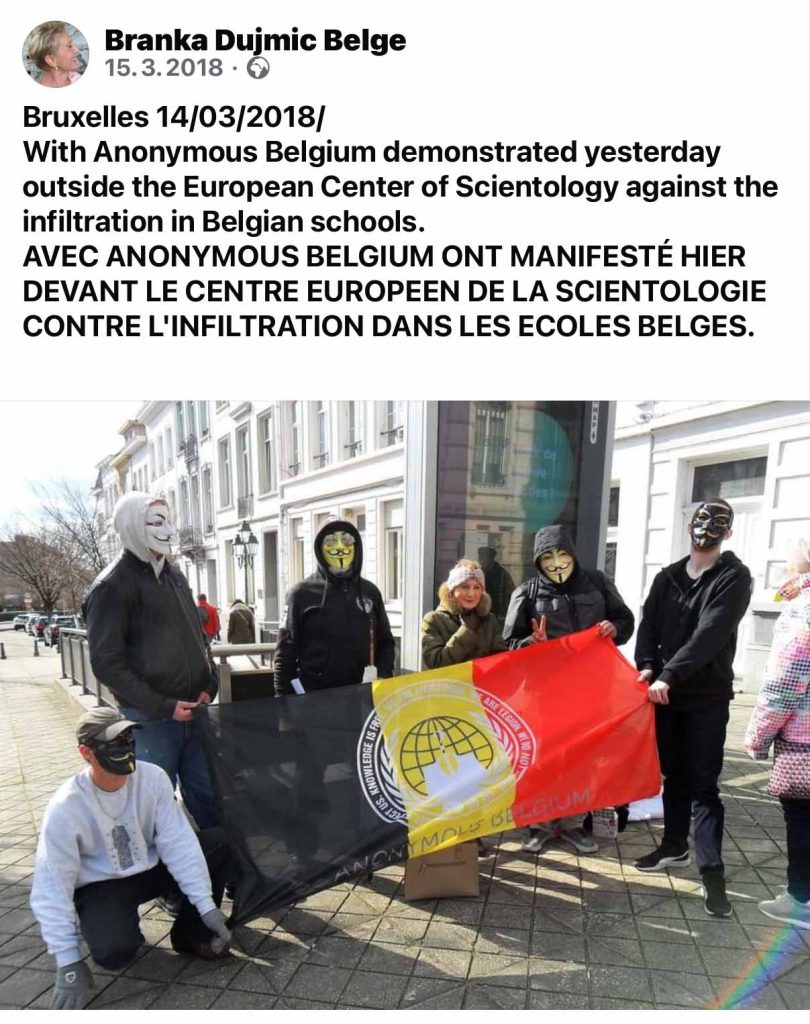
Alexander Dvorkin and the International Anticult Movement
After all of the above, in conclusion to this article, it is important to mention the documented interactions between anticultists from FECRIS and MIVILUDES with Alexander Dvorkin and other leaders of the Russian pro-religious organization RACIRS. This list is examined in the previously mentioned article “How the French MIVILUDES compromised itself with Russian extremists” by investigative journalist Yan Leonid Bornstein on The European Times news portal 20.
- In 2021 in Bordeaux, France, the newly appointed Chief of Miviludes Hanène Romdhane participated to the FECRIS symposium, along with Alexander Dvorkin, Vice-President of FECRIS.
- In 2019, in Paris, the representative of the MIVILUDES, Anne-Marie Courage, also shared the stage with Alexander Dvorkin.
- In 2018, in Riga, Latvia, the representative of the MIVILUDES, Laurence Peyron, also shared the stage with Alexander Dvorkin.
- In 2017, the Secretary General of the MIVILUDES, Anne Josso, shared the stage in Brussels with Dvorkin and Alexander Korelov, Dvorkin’s personal lawyer.
- In 2016 in Sofia, the former President of the MIVILUDES, Serge Blisko, shared the stage with Dvorkin and Roman Silantiev.
- In 2015 in Marseille, in 2014 in Brussels, in 2013 in Copenhagen and in 2012 in Salses-le-Chateau, Serge Blisko shared the stage with Dvorkin again.
- 2012: Also present was Georges Fenech, the outgoing president of MIVILUDES, who attended the 2011 symposium with Dvorkin in Warsaw.
- In 2011, Fenech also shared the stage with Alexander Novopashin, number 2 of the Russian FECRIS organisation. Novopashin calls Ukrainians “Nazis”, “Satanists” and “cannibals,” drives with a huge “Z” printed on his car, insists that Western cults were behind the Euromaidan and Ukrainian authorities, that “after an end will be put to Ukrainian Nazism, some other aggressor country will appear, through which the United States will begin to threaten Russia. A civilizational war cannot be avoided.”
In addition to this list, a second example that illustrates the scale of the influence of anti-democratic forces operating through the anticult international network of agents led by Alexander Dvorkin is the list of organizations on the official FECIRS website.
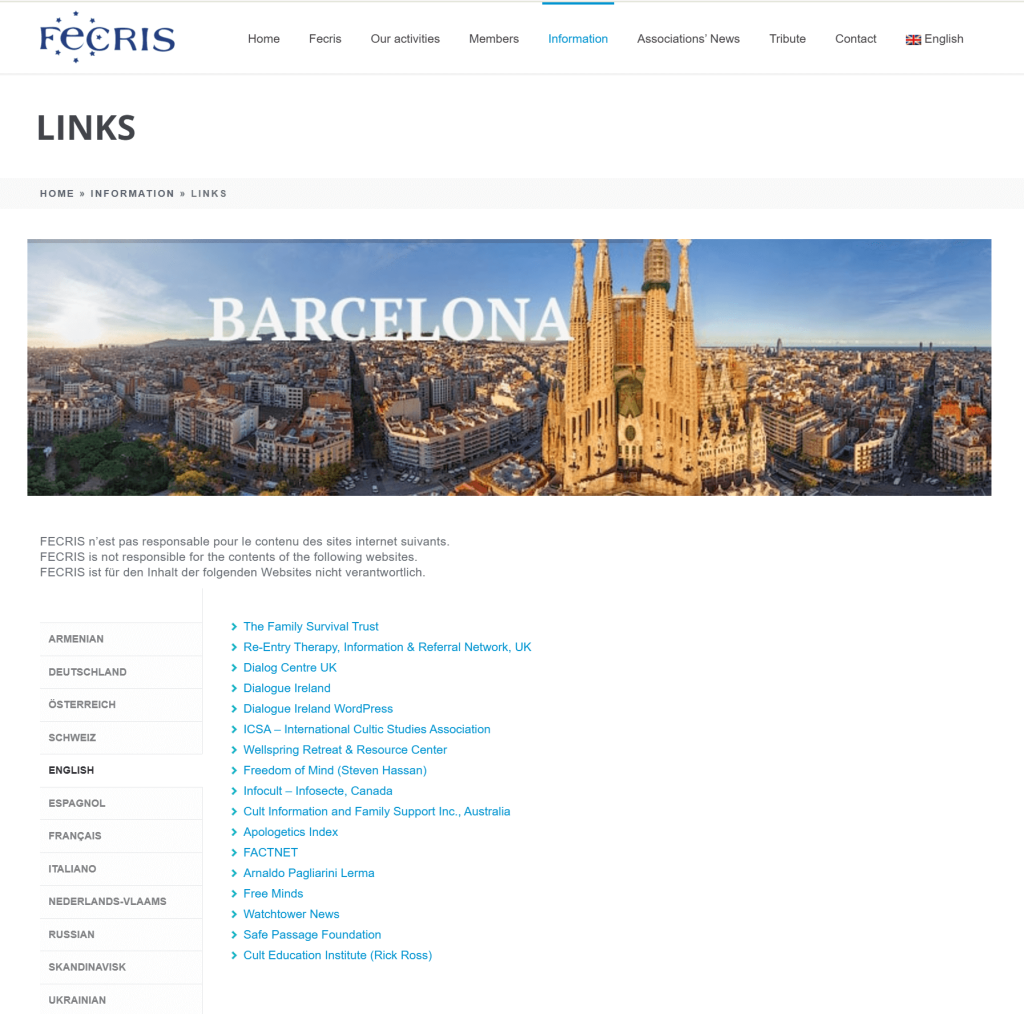
This list includes not only European anticult organizations but also American, British, and others. For instance, the British anticult organization “The Family Survival Trust,” led by the British anticultists Tom Sackville and Alexandra Stein, already mentioned in this article. Another example is the American anticult organization ICSA, closely associated with Janja Lalich (who, along with Alexandra Stein, was present in Riga in 2018). Additional examples include “Freedom of Mind,” the website of American anticultist Steven Hassan, and the Cult Education Institute, the website of American Rick Ross, among others.
Conclusion
In conclusion, we will provide a comment from Alice Bah Kuhnke, a Swedish Green Party MEP and Vice President of the Greens / European Free Alliance, which Tatjana Ždanoka was a member of until April 2022. The excerpt is taken from a report by The Insider, which has been repeatedly cited in this article.
“Kuhnke said news of Zdanoka’s espionage struck her as ‘terrible [but] unsurprising. After all, we [both] receive ongoing reports in the European Parliament, as parliamentarians. And I know, since I was a minister in the government of Sweden, about how Russia and Putin’s agents work, and they have networks everywhere.”
As for Russian agents and their networks everywhere, perhaps it is time for the public and for relevant authorities to pay attention to one of them?
To be continued.
Sources:
- https://sectes-info.com/fecris-statuts-et-membres/
- https://web.archive.org/web/20220308150220/https://rusojuz.lv/spisok-1-kandidaty-partii-russkij-sojuz-latvii-na-vyborah-v-13-j-sejm/#pll_switcher
- https://www.laikmetazimes.ebaznica.lv/2018/07/16/uzmanibu-antisektanti/
- https://en.wikipedia.org/wiki/Category:Latvian_Russian_Union_MEPs
- https://www.fakeobservers.org/fake-election-observers.html
- https://eng.lsm.lv/article/politics/politics/five-latvian-politicians-named-as-politically-biased-election-observers.a365793/
- https://eutoday.net/tatjana-zdanoka-russian-intelligence/
- https://jamestown.org/program/zhdanoka-candidacy-polarizes-latvian-election/
- https://arvamus.postimees.ee/130481/kaspar-naf-eurovalimised-tugevdasid-lati-venemeelseid
- https://bnn-news.com/112070-112070
- https://www.baltictimes.com/news/articles/34591/
- https://www.baltictimes.com/news/articles/35355/#.VA97mRbgJHU
- https://www.expressen.se/nyheter/varlden/eu-ledamot-rysk-agent-avslojas-av-lackta-mejl/
- https://www.politico.eu/article/eastern-outsider/
- https://eng.lsm.lv/article/politics/politics/zdanoka-leaps-to-the-defense-of-russia-today.a211773/
- https://eng.lsm.lv/article/politics/politics/updated-latvias-meps-split-on-russian-propaganda-threat.a211721/
- https://bnn-news.com/latvian-russians-union-threatens-with-war-if-victory-monument-tampered-with-233947
- https://theins.ru/en/politics/268694
- https://eng.lsm.lv/article/society/crime/23.07.2024-former-mep-zdanoka-subject-of-security-service-searches.a562405/
- https://europeantimes.news/2022/08/how-the-french-miviludes-compromised-itself-with-russian-extremists/
- https://europeantimes.news/2022/07/15-ngos-send-letter-to-secretary-blinken-to-throw-pro-russian-anticult-organization-out-from-united-nations/
- https://www.europeantimes.news/es/2022/11/fecris-under-fire-82-prominent-ukrainian-scholars-ask-macron-to-stop-funding-it/
- https://europeantimes.news/2023/05/fake-associations-fecris-downfall/
- https://pstgu.ru/people/dvorkin-aleksandr-leonidovich/
- https://radonezh.ru/authors/dvorkin
- https://fedpress.ru/person/2719692
- https://www.thefamilysurvivaltrust.org/who-we-are
- https://www.ansobor.ru/news.php?news_id=355
- https://www.newsru.com/religy/22may2009/konovalov.html
- https://iriney.ru/sektyi-i-kultyi/sektovedenie/novosti-sektovedeniya/sektoveda-aleksandra-dvorkina-ne-pustili-v-evroparlament-na-slushaniya-o-svobode-religii-v-rossii.html
- https://gorod.lv/novosti/117748-vmeshatelstvo_zhdanok_ne_pomoglo_rossiyskomu_sektovedu_dvorkinu_popast_v_evroparlament
- https://www.tvnet.lv/8139941/belgijas-likumsargi-paviesojusies-zdanokas-majokli-brisele
- https://rus.delfi.lv/57860/latvia/52106075/sgb-zakryl-delo-protiv-zhdanok-sostav-prestupleniya-v-ee-vyskazyvaniyah-ne-obnaruzhen
- https://www.baltictimes.com/news/articles/34896/
- https://www.baltictimes.com/news/articles/10333/
- https://www.fecris.org/uncategorized/life-after-the-cult-help-for-victims-and-resocialisation/
- https://fecris.org/conferences/bruxelles2017/Frederic_EN.pdf
- https://ansobor.ru/news.php?news_id=1728

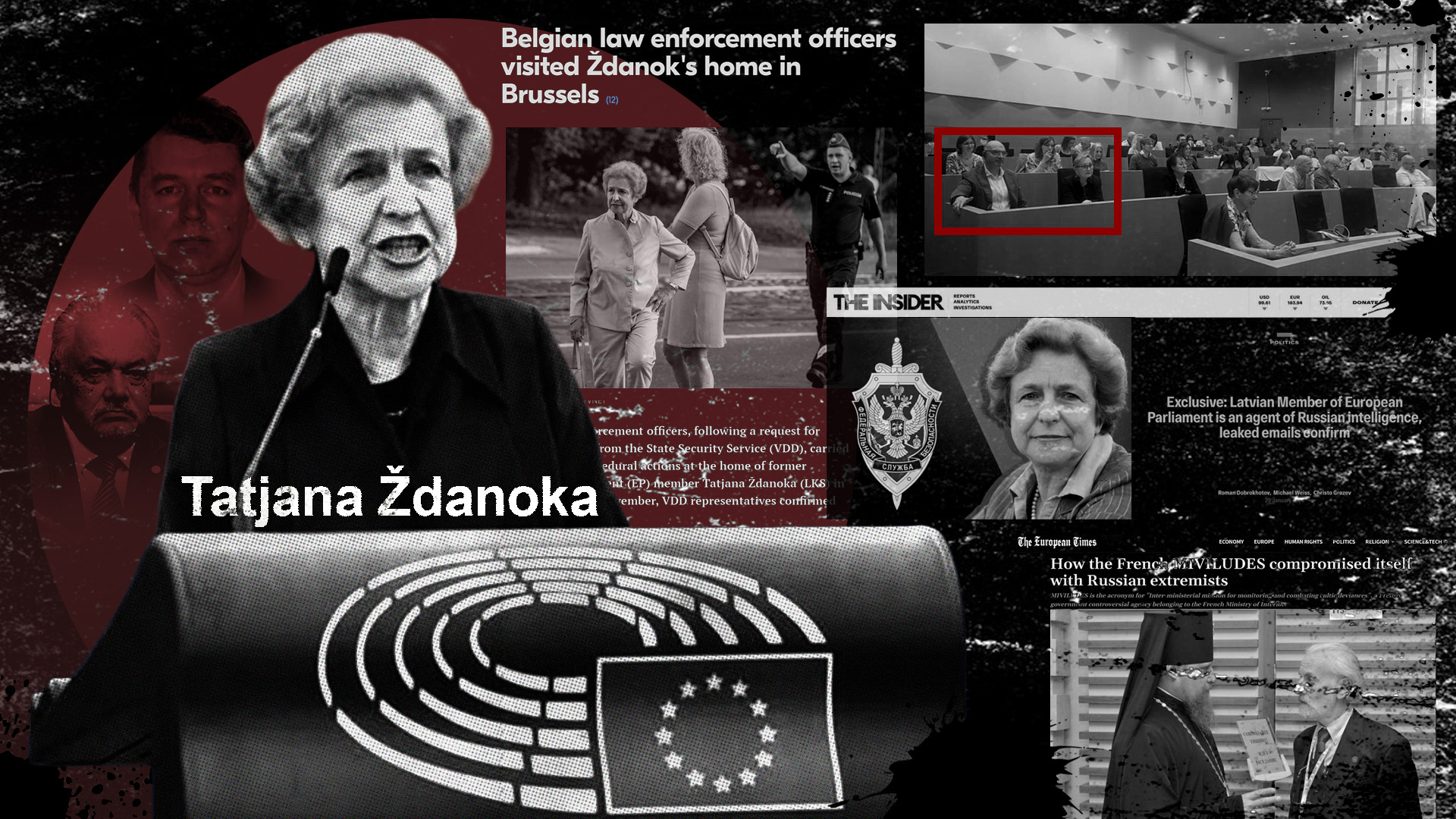
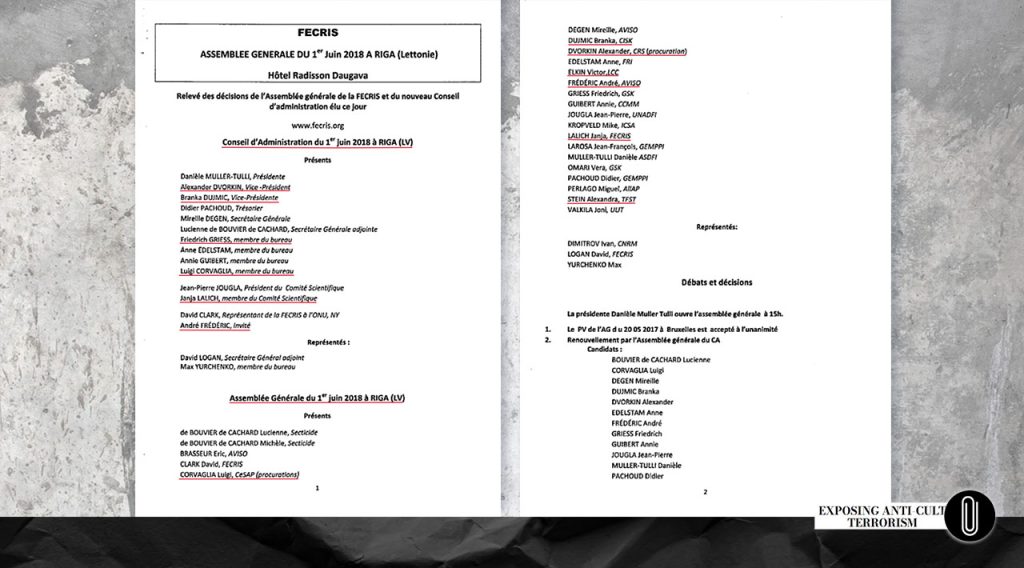
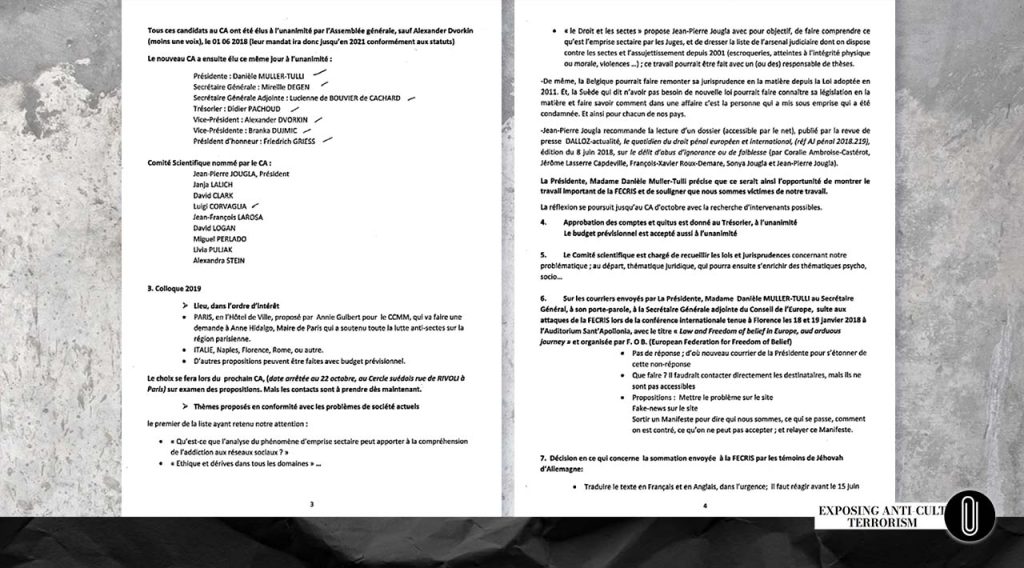
![Screenshots from the Ansobor website [38]](https://actfiles.org/wp-content/uploads/2025/01/57-1024x803.png)
